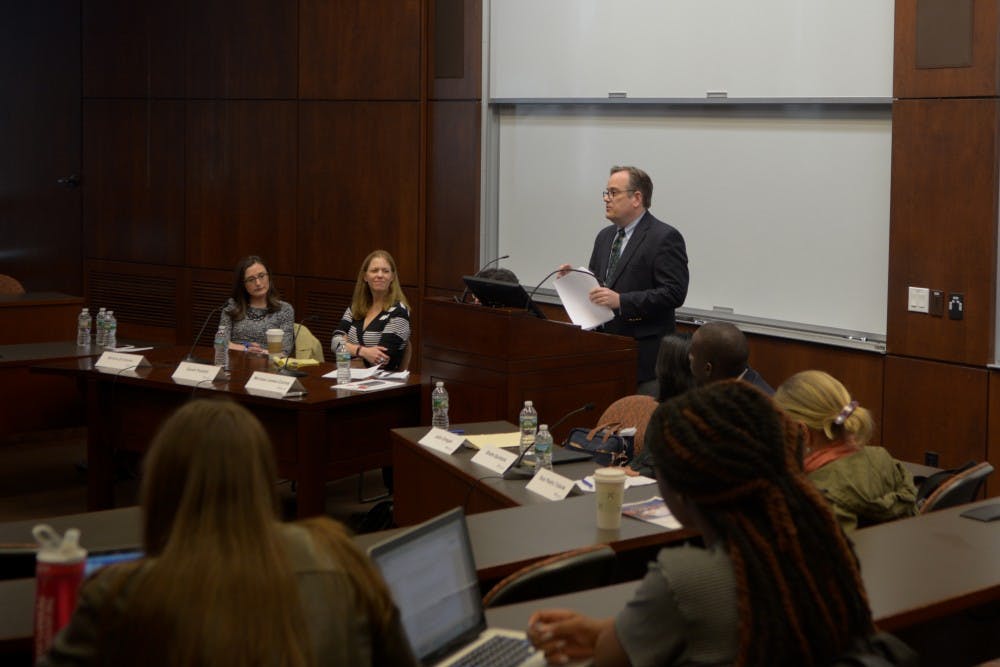As the Trump administration's sweeping immigration polices continue to play out in federal courts, the immigration status of students across the country have hung in the balance, and universities have had to ask themselves what role they must serve to their affected students.
On Wednesday evening, students, faculty, and immigration experts gathered at Penn Law to grapple with that very question.
Titled "Immigration Town Hall: The Role of the University in Responding to and Shaping Immigration Law and Policy," the event discussed the intricacies – and ambiguities – of sanctuary city policy and Penn's role within the immigration debate.
The event centered on policies instated by the White House under President Donald Trump, namely an immigration ban implemented late last year, and the administration's efforts to repeal Deferred Action for Childhood Arrivals program, which the Obama administration implemented and protects nearly 790,000 young people in the United States.
The event was moderated by John Grogan, a 1993 Penn Law graduate and a seasoned immigration lawyer who helped represent an undocumented immigrant in the landmark case Buck v. Stankovic.
Grogan was joined by panel of seasoned lawmakers, litigators, and social activists whose work have been centered around immigrant rights in the Philadelphia area.
The panel included Michael Jones-Correa, a political science professor and director of Penn's Center for the Study of Ethnicity, Race and Immigration, Sarah Paoletti, a law professor and director of the Penn Law Transnational Legal Clinic, Sozi Pedro Tulante, a law professor and former City Solicitor for Philadelphia, Miriam Enriquez, the Executive Director of the Philadelphia Mayor's Office for Immigrant Affairs, and Sheila Quintana, Community Organizer, New Sanctuary Movement of Philadelphia.
Paoletti discussed the difficulty of helping students while still protecting them.
RELATED:
Phila.'s DA created a new 'immigration counsel' position to safeguard immigrant rights
Penn alumnus on his work in immigration law: 'none of us were prepared for Trump'
She noted that Penn does not keep track of the number of undocumented students enrolled at the University, so it can be hard to proactively reach out to students affected by changes in immigration law. Paoletti added that when she hosted several pop-up legal consultation clinics throughout 2017 to help DACA recipients and undocumented students, very few showed up to receive help. She attributed it partly to a lack of student information and fear among potential participants.
She also noted that creating a centralized list of this information could be potentially dangerous if it were leaked to people outside of Penn.
As such, an overarching theme of the debate was how Penn, as the city's "neighbor" and largest private employer, could play a role in the immigration debate.
“They are definitely a good neighbor to the city of Philadelphia, but to say that they are a good neighbor to the immigrant community is a hard question," Enriquez said.
Quintana emphasized the importance of partnering with universities to create community-based research that identifies feasible policies and changes within the Philadelphia community.
“The leadership should be by those who are most affected by an issue,” she said.
For Jones-Correa, his concerns as an academic lie in ways that Penn could start to look outward from an insular academic environment.
“Students keep their sights in the university and beyond the university, but rarely in the city,” he said. “We need ways to engage students and faculty with their immediate surroundings.”
The program was part of the Penn's Teach-In project which curated dozens of university-wide events across campus aimed at the "the production, dissemination, and use of knowledge." The town hall debate was initially scheduled to take place on Wednesday, March 21. However, the event was postponed after campus operations were halted due to a severe snow storm.
Even though members of the Penn administration have taken a strong stance against the Trump administration's decision to revoke DACA, student-led protests punctuate campus life, demonstrating that many members of the Penn community continue to face uncertain futures.
On repeated occasions, students arms-locked or armed with signs have taken to College Green as a show of solidarity for affected "Dreamers" and international students alike.
On Nov. 30, 2017, Penn President Amy Gutmann declared the University as a 'sanctuary' for students, thereby joining the ranks of "sanctuary campuses" across the country. The City of Philadelphia has also designated itself a sanctuary city, despite the Trump administration's efforts to rescind federal funding.
But despite Philadelphia's sanctuary status, the Philadelphia Immigration and Customs Enforcement field officers have arrested more immigrants without criminal convictions than any other ICE region – 64 percent of its “at-large” arrests in total.
For Paoletti, the initial protests from Penn students following Trump’s string of executive orders were valuable, but the real challenge for her, students, and the Penn administration is to participate in harder, more long-term, immigration issues.
“That was the easy work,” she said. “We sort of got ourselves into sort of chasing the next fireball, but there is a forest fire behind us."



